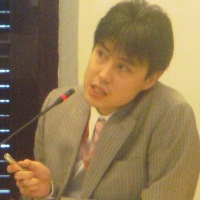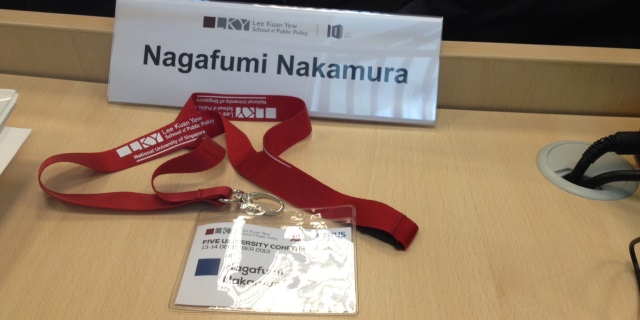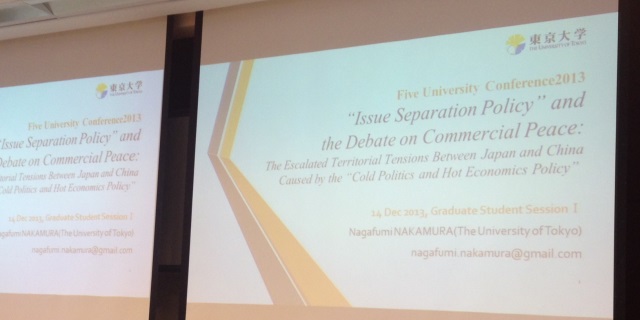Participating in Five University Workshop

PhD Student, the Graduate School of Arts and Sciences, the University of Tokyo
On December 13-14, 2013, I participated in the “Five University Research Collaboration Conference” held in Singapore. This conference was a sustained discussion concerning East Asian security cooperation and regional governance, among scholars and students from five universities: Peking University, Princeton University, Korea University, National University of Singapore, and the University of Tokyo. There were six general sessions and two graduate sessions at this conference. I have divided my report into three parts. First, I address the sessions at which scholars presented papers. Next, I address the graduate sessions. Finally, I address the future of the “Five University Conference” and my future work.

General Sessions
In each session, after several scholars presented their research, an open discussion was held. Although every session was compelling, I was interested in the following three points related to my study. First, conference participants shared the idea that the situation of political rivalry and economic ties has been a feature in East Asia, and a puzzle for International Relations scholars.
Second, almost all the scholars expressed caution regarding anti-foreign nationalism related to territorial tensions. Moreover, the idea discussed was that it is difficult to manage anti-foreign nationalism.
Finally, the scholars in Singapore emphasized that territorial tensions should be resolved through international organizations such as International Court of Justice (ICJ) and through institutions of international law such as United Nations Convention on the Law of the Sea (UNCLOS). At first glance, this appears to be an obvious idea. However, the need for such organizations can be observed with regard to Japan and China, and the conflict over the Senkaku/Diaoyu islands, because both states tend to rely on power politics (see the establishment of an air-defense identification zone by China and the new National Defense Program Outline of Japan).
Graduate Sessions
I was the first speaker at the graduate sessions. My presentation and paper, titled “‘Issue SeparationPolicy’ and Debate on Commercial Peace,” discussed the escalation process of territorial tensions between two states with a high level of economic interdependence. Previous research (the debate on commercial peace) was developed only by examining the level of economic interdependence; however, it does not adequately explain when and why territorial tensions escalate. The concept of an “issue separation policy” (a policy that intentionally separates issues, which can otherwise be easily linked) is the key variable for solving the problem.
Specifically, a “cold politics and hot economics policy” (a policy whereby political measures such as canceling summit meetings are taken, but economic measures such as the suspension of human exchanges and embargos are not) causes the escalated territorial tensions surrounding the Senkaku/Diaoyu islands, because the option of adopting extreme policies regarding territorial tensions emerges from a sense of security that conflicts in the political realm will not spill over into the economic realm. In addition, there is an increased incentive for both states to choose extreme policies because of the increase in anti-foreign nationalism in domestic, public opinion that is instigated by territorial tensions. Fortunately, many helpful comments and questions were offered at this presentation.
Future Work
As mentioned above, this conference stimulated our thinking; however, I was the only Japanese graduate student. I would like to recommend that other graduate students participate in the next conference. I would like to attend the next conference as well. Testing whether the “issue separation policy theory” applies to other territorial problems remains a critical issue that requires further investigation.

